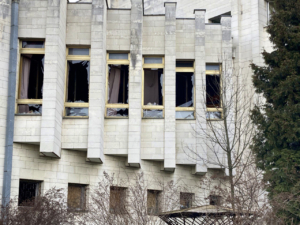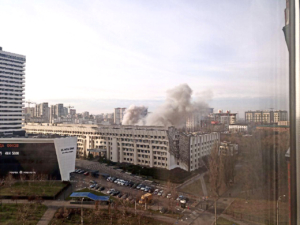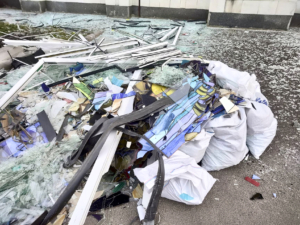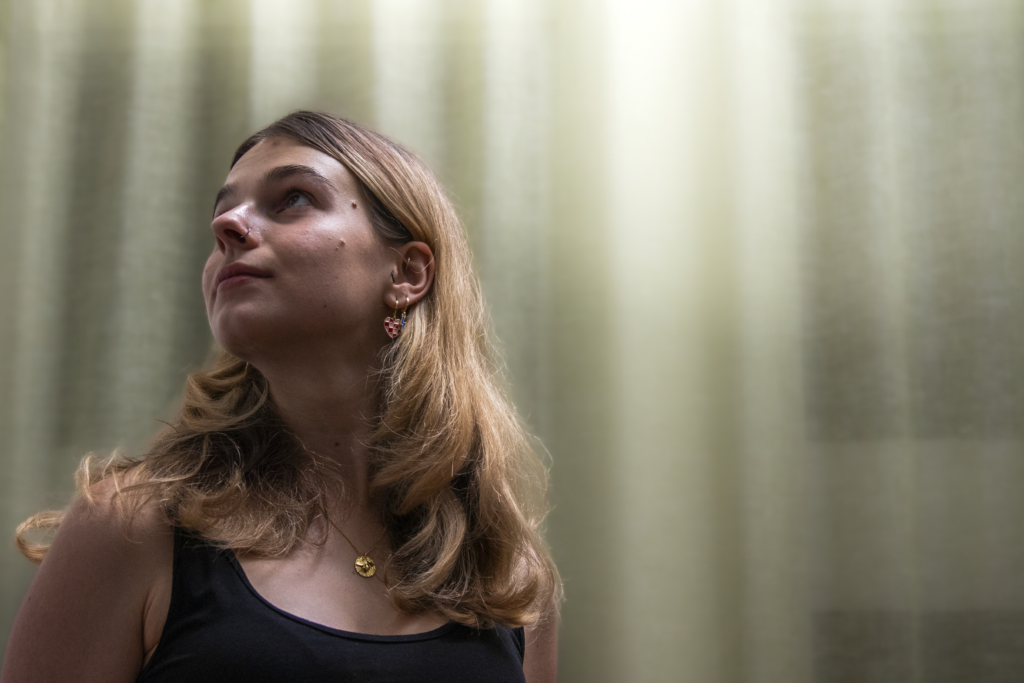Sofia Panashchuk had to flee Kiev when the war broke out in Ukraine and came to Sweden last summer to work at Lund University. Now she’s back, even if it’s just for a short time, before returning to her studies in Ukraine.
Sofia, however, will not spend the weekend in a sunny Lund. Tomorrow she is going back home to Kiev. There she will resume her studies at Kiev University where she is doing her 4th year on a bachelor’s in biology. When the war began in February last year, Sofia was living in the capital. It didn’t take long until she and her family realized that the situation was becoming too dangerous with heavy bombings of the city and they had to escape.
– Once my studying started back up I didn’t really know what to do because I was bored most of the time. I found out that my university was collaborating with other universities and offering places for students in labs, she says.

Photo: @kiev.university on Facebook.
She continues to explain that Lund university was the first to respond and give her a stipend, so last summer she came here to work at the Kemicenter for three months. She smiles when I ask her how her time here was.
However, she explains that she could not stay here after her summer job ended, no matter how much she had enjoyed it. Her bachelor’s in Ukraine wasn’t finished, and therefore she had to go back. She stayed in Kiev during all of September last year, but in October there were bombings right near her house two weeks in a row. The buildings next to her house were completely destroyed.
I had to pass one of my exams in a postal office
Her grandparents live in a village in the countryside, away from the immediate fighting, safer and more secluded. When the situation became worse in Kiev she decided to go and live there instead. But other problems arose then. Because of the attacks on power plants, electricity wasn’t always accessible, or there could be planned power outages to save electricity. Usually, the villages were more exposed to these blackouts, something that disrupted her schoolwork heavily. Internet access was also paramount for her studies since all of it was online, but that posed a problem as well.
– I even had to pass one of my exams in a postal office because we didn’t have electricity and I had a set time for the exam. So, I had to go to the post office and sit in my coat and charge my laptop while writing the exam from there.
That time in her life was quite different from the week of relaxation Sofia has had when I meet her in Lund this sunny afternoon. She returned to Sweden this week to meet with
friends and talk to other students about doing her master’s degree here. She is curious about the biotechnology program and even though it can be hard to transfer her academic credits, she hopes to get some financial help from grants that are given to people with refugee status. Tomorrow, she needs to take a flight from Copenhagen to Poland and then take a bus over thePolish-Ukrainian border and then onto Kiev.
How do you feel about going back to Ukraine now? Do you have any fears about it?

Photo: @kiev.university on Facebook.
When we continue to talk, she admits that she is also a bit excited about going back to campus after spending all of her first three years online, due to first covid and then the war. The social aspects of studying and having the classical university experiences her older co-workers talk about is something Sofia hopes to have. She also sees the possibilities that being together brings to help those who are fighting in the war.
Her dad is in the military and everyone she knows has some close connection with those who are fighting. When I ask about her feelings towards joining the military, she seems calm.
– I know that I can’t complain about how things are if I don’t do anything to change them, so I’ve accepted that any day I could go off and try to help and try to save lives. I’ve also accepted that any day could be my last day and it’s actually kind of easier living like that because you feel like you have a purpose. You feel like you can do something in your life, and you’re trying to live it to the fullest, knowing that tomorrow you could get mobilised and go to the front line. Yeah, but I would be honoured to help save lives if I needed to.
You can’t really go to sleep in Ukraine
Being in Sweden has given her a well-needed reprieve from the trauma she experiences in Kiev. She is less scared of loud sounds here and she is not constantly checking her phone to see if there’s a potential attack. She is also sleeping better here, where her sleep is not being disturbed by bombings and air alarms.
– You can’t really go to sleep in Ukraine knowing that you’re going to get a full night of sleep, most of the time it might happen that you’re going to go to the shelter at least once during the night.
She says that some nights at home it feels like the Russians are toying with them. As soon as the Russian aeroplanes leave the ground, the air raid siren in Kiev goes off and everyone has to go to the shelter. Then the aeroplanes would land again after an hour and she could go home and try to sleep, only to hear the air raid siren after some time and repeat the whole process.

Even if she is happy about having had the opportunity to be in Sweden, it’s also brought a lot of guilt. There is a curfew in Kiev, so you can’t go out between midnight and 5 pm, so being out during the night with friends has been weird because she’s been thinking about those backhome who aren’t able to do that.
Although her visit to Lund was short this time, she hopes to be back this winter to visit friends here and to hear about how the project she did with the chemistry department turned out. For now, a long journey back home awaits.









